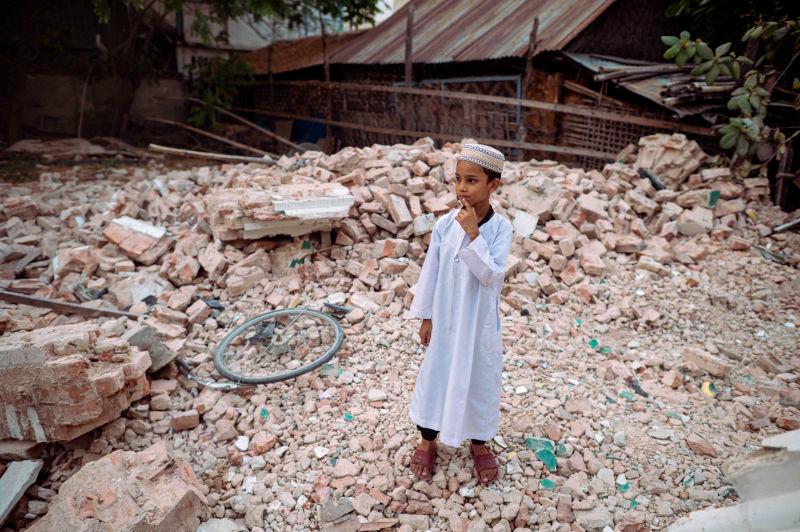MANDALAY: Hopes faded Monday of finding more survivors in the rubble of Mandalay, where some residents spent a third night sleeping in the open after a massive earthquake killed more than 1,700 people in Myanmar and neighbouring Thailand.
The tempo and urgency of rescue efforts was winding down in the central Myanmar city of more than 1.7 million people, one of the worst affected by Friday's devastating 7.7-magnitude quake.
Overnight, people camped out in the streets across Mandalay, either unable to return to ruined homes or nervous about the repeated aftershocks that have rattled the city over the weekend.
Some had tents but many, including young children, simply bedded down on blankets in the middle of the roads, trying to keep as far from buildings as possible for fear of falling masonry.
More than 1,700 people are confirmed dead across Myanmar, according to the ruling junta, which has declared a week of mourning.
Thousands more were injured and over 300 remain missing.
At least 18 deaths have been confirmed hundreds of kilometres (miles) away in Bangkok, where the force of the quake caused a 30-storey tower block under construction to collapse.
But with communications down in much of Myanmar, the true scale of the disaster has yet to emerge and the death toll is expected to rise significantly.
Outdoor hospital
Mandalay's 1,000-bed general hospital has been evacuated, with hundreds of patients being treated outside.
With temperatures forecast to hit 40 degrees Celsius (104 Fahrenheit) on Monday, patients lay on gurneys in the hospital car park, many with only a thin tarpaulin rigged up to shield them from the fierce tropical sun.
Relatives did their best to comfort them, holding hands or wafting them with bamboo fans.
“This is a very very imperfect condition for everyone,“ said one medic who asked to remain anonymous.
“We’re trying to do what we can here. We are trying our best.”
The sticky heat has exhausted rescue workers and accelerated body decomposition, which could complicate identification.
But traffic began returning to the streets of Mandalay on Monday, and restaurants and street vendors resumed work.
Hundreds of Muslims, meanwhile, gathered outside a destroyed mosque in the city for the first prayer of Eid al-Fitr, the holiday that follows the Islamic fasting month of Ramadan.
The main quake and a 6.7-magnitude aftershock that followed soon afterwards have downed bridges and buckled roads, making access to some affected areas difficult.
Aftershocks rattled Mandalay over the weekend, spurring residents to flee into the streets in multiple instances of brief panic.
Humanitarian crisis
The challenges facing the Southeast Asian country of over 50 million people were immense even before the earthquake.
Myanmar has been ravaged by four years of civil war sparked by a military coup in 2021, with its economy shattered and healthcare and infrastructure badly damaged.
The World Health Organization (WHO) declared the quake a top-level emergency as it urgently sought $8 million to save lives and prevent disease outbreaks over the next 30 days.
The International Federation of Red Cross and Red Crescent Societies launched an emergency appeal Sunday for more than $100 million to help victims.
International aid and rescue teams have been arriving after junta chief Min Aung Hlaing made an exceptionally rare appeal for foreign assistance.
In the past, isolated Myanmar's ruling generals have shunned foreign assistance, even after major natural disasters.
Junta spokesman Zaw Min Tun thanked key allies China and Russia for their help, as well as India, and said the authorities were doing their best.
“We are trying and giving treatment to injured people and searching for missing ones,“ he said in a statement to journalists.
But reports have emerged of the military carrying out air strikes on armed groups opposed to its rule, even as the country grapples with the quake aftermath.
One ethnic minority armed group told AFP on Sunday that seven of its fighters were killed in an aerial attack soon after the tremors hit, and there were reports of more air strikes on Monday.
Myanmar's raging civil war, pitting the military against a complex array of anti-coup fighters and ethnic minority armed groups in the civil war, has displaced some 3.5 million people with many at risk of hunger.
Bangkok building collapse
In Bangkok rain fell on Monday morning at the site of the collapsed building, where diggers continue to clear the vast pile of rubble.
Officials say they have not given up hope of finding more survivors in the wreckage, where 11 deaths have been confirmed and at least 76 people are still unaccounted for.









